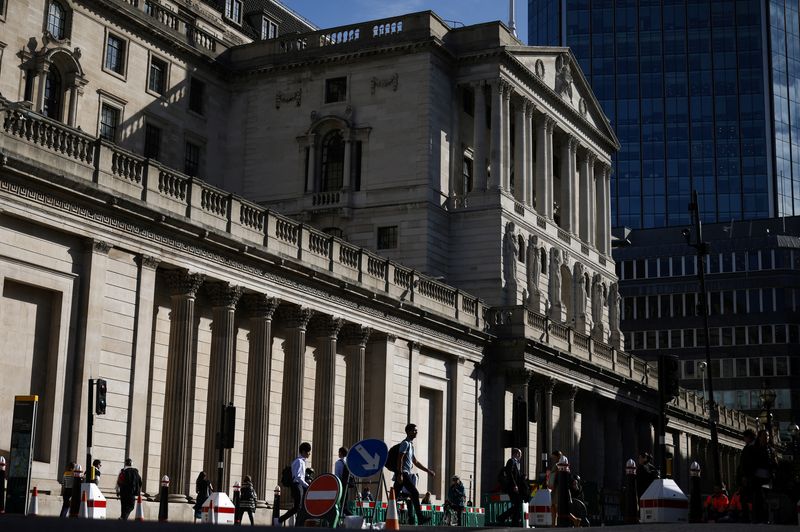By David Milliken and Andy Bruce
LONDON (Reuters) -The Bank of England raised its key interest rate by a quarter of a percentage point to 4.5% on Thursday and Governor Andrew Bailey said the British central bank would "stay the course" as it seeks to curb the highest inflation of any major economy.
The BoE is no longer predicting a recession after it made the biggest improvement to its growth projections since it first published forecasts in 1997.
But it now expects inflation - which remained above 10% in March - to fall more slowly than it had hoped, mostly due to unexpectedly big and persistent rises in food prices. It also saw stronger wage growth than it previously thought.
"We have to stay the course to make sure inflation falls all the way back to the 2% target," Bailey said at the start of a press conference before stressing that the BoE was not sending any signals about its next moves, which would depend on data.
Policymakers voted 7-2 for May's increase, in line with economists' expectations in the Reuters poll, with Monetary Policy Committee members Silvana Tenreyro and Swati Dhingra again opposing further tightening.
A Reuters poll last week showed most economists expected a 12th straight quarter-point rise in May - taking borrowing costs to their highest since 2008 - before a period on hold.
But investors have been betting on more increases and after Thursday's decision they were pricing in a peak of almost 5% this autumn.
"If there were to be evidence of more persistent pressures, then further tightening in monetary policy would be required," the BoE said, maintaining its message from earlier this year.
The pound rallied against the dollar and briefly hit a five-month high against the euro after the BoE decision, before falling back as the dollar strengthened after U.S. data.
Speaking later, Bailey said he hoped the BoE was now near the end of its tightening cycle, but it was too soon to be sure.
"We are approaching the point when we should be able to ... rest in terms of the level of rates," he told Bloomberg TV.
Citi said it expected at least one more rate rise by the BoE at its next meeting in June, and the possibility of a further increase in August, taking rates to 5%.
"Whereas in February we thought a plausible interpretation was that the MPC believed its work to be done ... the MPC have done more in this release to push against such an interpretation," Citi economist Ben Nabarro said.
The BoE was the first major central bank to start raising borrowing costs in December 2021, but was criticised by some for not moving aggressively enough as inflation headed towards a four-decade high of 11.1% struck in October.
Last week, the U.S. Federal Reserve and the European Central Bank both raised their benchmark borrowing rates by 25 basis points. While Fed Chair Jerome Powell hinted at a pause, ECB President Christine Lagarde said it was too soon to stop.
Britain's high inflation problem stems largely from its dependence on imported natural gas for power generation, leaving it particularly exposed to the surge in energy prices after Russia's invasion of Ukraine last year.
Energy prices have now fallen sharply and the central bank expects inflation to drop to 5.1% by the end of this year from 10.1% in March. But this is less of a decline than the drop to 3.9% it forecast in February and the BoE predicts inflation will not return to its 2% target until early 2025.
Higher forecasts for food prices added about 1 percentage point to future inflation compared with February, the BoE said.
Most BoE policymakers saw "significant" upward risks to these inflation forecasts and - taking these risks into account - inflation was not forecast to significantly undershoot its target at any point in the next few years, even if Bank Rate were to rise by another quarter point or more.
PAY GROWTH PRESSURES
The BoE is worried that recent strong headline pay growth could turn into a long-lasting problem for the economy, and on Thursday it forecast much stronger wage growth and lower unemployment than three months ago.
"Pay rates could plateau at rates above those consistent with the 2% inflation target sustainably in the medium term," the central bank said.
BoE Chief Economist Huw Pill said last month that British businesses and individuals had to accept that their earnings had fallen in inflation-adjusted terms, triggering criticism from trade unions and drawing a rebuke from Bailey on Thursday.
The BoE forecast the economy would grow 0.25% this year, up from its February prediction of a 0.5% contraction.
Cheaper energy, fiscal stimulus and improved business and consumer confidence mean the BoE now no longer predicts a recession this year, and expects the economy to be 2.25% larger in three years' time than it did before.
The government's budget announced in March was expected to boost economic output by around 0.5% over the coming years.
The BoE estimated that only around a third of the total impact of its past interest rate hikes has so far fed through to households and businesses, a slower pass-through than in previous tightening cycles because of a higher share of homeowners with fixed-rate mortgages.
Asked if the central bank was at risk of over-tightening, Bailey said the extent of the impact of the BoE's previous rate hikes was a "very lively subject of debate" among MPC members.
